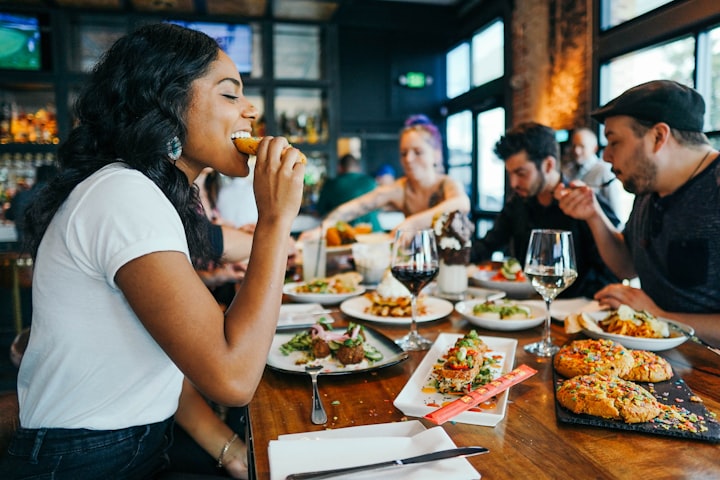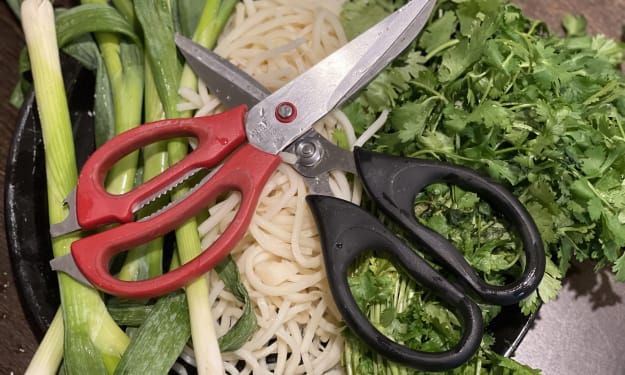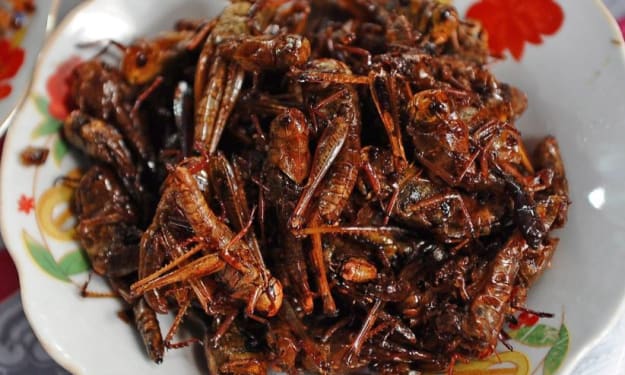The Free Restaurant
Good food should be available to everyone. Always.

I have a roommate who hates eating. He views food as a distraction and a hassle. Once a month, he buys a couple of pounds of hamburger, some jars of tomato sauce, and some macaroni. He cooks it up, and when hungry, he nukes a scoop or two. At the end of the month, he tosses what's gone bad. Even though he's shown a total disregard for "cuisine," he acknowledges that he needs to eat.
Eating is part of the human condition.
Healthy food, clean water, clean air, sleep, clothing, shelter, and a healthy "roll of the dice" on occasion. These are the basic human needs. Maslow's Hierarchy of Needs. At the risk of being called a communist, a socialist, or a Christian, if we're going to construct a formal society, it seems we should focus on these things.
We could debate the merits of Maslow, but it'd be hard to find a person that denies these are the basics. Instead, you find people who argue whether everyone deserves these things. For the sake of my sanity, I'm going to presume that everyone deserves these things. Saints, sinners, the poor, criminals, even dill holes who rank rocket ships over people.
A sticky term that politicians and pundits like to throw around is "American Exceptionalism." So that you and I can have an honest discussion, I need you to know that this term is utter nonsense. It's a bit like talking about "American Air" or "American Water." We don't own exceptionalism. It passes through us, perhaps, but it comes out as drool, piss, burps, and farts as much as anything else.
"Exceptional Americans" have constructed a society where the bulk of the work is done by people distracted by the hunt for basic needs. What's more, in our current system, those who make the least amount of money have the highest financial consequences.
The Washington Post: "Why it costs so much to be poor in America"
The Coalition of Human Needs: "The High Cost Of Being Poor In The U.S."
We make entertaining television shows about people turning to criminal enterprise to make ends meet. We identify with it. We also happen to have the world's highest incarceration rate. Some estimate as many as 1 million people in jail due to offenses indirectly related to poverty. Then there are half a million in prison simply because they cannot pay for release (AAF).
Low wages, the cost of childcare, the cost of healthcare, and the cost of living plays a part in this. And all that comes before we plug in American classics like justice inequality, systemic racism, and sexism.
We live in a distracted society that appears to combat "exceptionalism" with the need for... well, I don't know. The need to punish people for being inconvenient? The desire not to see people "get away with something?" Are we doing this for the children? To strike fear into the hearts of those who would do us wrong?
But what does all this have to do with free food?

The Romans had "Cura Annonae" ("care of Annona"). Named after the goddess Annona, she wasn't a goddess in the traditional religious way, so much as a goddess in the government propaganda way. She was an institutional offshoot of Ceres. Imagine if the US Government gave Wonder Woman a sister, altered her costume, reduced her powers, and instructed people to ask her for food. Kind of like a "Grocery Santa."
Cura Annonae started off as sporadic gifts of grain to the people around 509 BCE. Then, over the next 400 years, it grew more predictable and dependable.
Via Wikipedia:
Adult male citizens (over 14 years of age) of Rome were entitled to buy at a below-market price five modii, about 33 kilograms (73 lb), of grain monthly. Approximately 40,000 adult males were eligible for the grain. In 62 and 58 [BCE], the number of Romans eligible for grain was expanded and grain became free to its recipients.
This continued until about 476 CE (possibly later), and by that point, the ration involved bread, olive oil, wine, and pork. For almost 1000 years, the Romans fed their populace and kept improving the benefit. This seems an expensive proposition (about 34% of state revenues), but most historians don't list this "freebie" as part of Rome's downfall. In fact, large portions of this government benefit were obtained through the free market. This act helped fuel the economy. Improving the lower class's living conditions also allowed them to spend more on stuff produced by the rich (*capitalist wink*).
There were problems. This food may not have always been of the best quality, and we can't ignore that Rome was sustained by slave labor. Often held up as an example of the "bread and circus" ideology. The masses were supposedly kept docile by being fed and entertained.
As for that last part, I'd argue that the Roman satirical poet Juvenal was missing the greater point while shooting for satire. Perhaps a well-fed person is more docile, but they are also healthier, more emotionally secure, and more capable of production. We don't criticize a "well-oiled machine" for being dependant on the oil.

Free food has a long legacy of positive action. The Black Panthers helped push children further and farther through their free breakfast program. The Panther's program actually inspired the US government to change its approach for all students.
See how everyone benefits when black lives matter?
Speaking of black men of action, Christians hold up Jesus' ability to pass out free Fishamajigs® and Franzia® as proof of his divinity. Cake brings people to the office. Pizza allows people to move apartments. Milkshakes bring Daniel Day-Lewis to brutally murder Paul Dano in the yard.
I joke about this because it's tough to convince some people that everyone deserves the basics. That giving everyone the bare minimum helps level the playing field (partly) and fosters equality.
It's easy to focus on personal convenience and shortsighted ideals over the sanctity of human life. These are the people who will toss out that famous piece of advice about teaching people to fish. They forget that a person unconcerned with fishing can use that time to build homes, cure cancer, and launch rockets.
I wouldn't trust Elon Musk to make a sandwich, let alone catch and cook a trout.
Now that I've alienated people and trimmed some silverskin, I'll continue on to the actual point of this essay.
In a government of the people, every action (or inaction) we make results in our society. Our responsibility, as the government, is to protect and foster each other. We share in this responsibility. As a person working in the food industry, I feel confident that there are ways to provide quality food for everyone.
I am not a Christian. I am not a politician or a teacher, and I don't have any sort of pedigree. I watch a lot of movies and TV. I love a good story. I enjoy playing penny slots. On my good days, I'm a decent cook.
Not long ago, I came across the following writing prompt:
"Tell us what brings you true fulfillment and how you could monetize that passion in a perfect world."
Cards on the table. Monetizing one's passion sounds a little sus. But this question did come with a writing contest with a thousand-dollar prize.
I will not win. I missed the deadline. Partly because I'm insecure about my writing and procrastinating. Yet, also because, since my Faucci Ouchi, I've been working 12-14 hour days back-to-back-to-back in the restaurant industry. I spend most of my time outside work, completely exhausted.
It's an industry that I love. But it often takes everything out of me.
At what I consider to be my most prestigious point in this business, I was a baker for a restaurant. It was considered by people society calls "experts" to be one of the best new restaurants in America.
I worked 60 hour weeks, I could barely make rent, and I couldn't afford food. I wasn't even getting the traditional restaurant perk of "family meal" because I worked opposite hours. Instead, I'd take home two-day-old bread, toast it up, and put whatever condiment or sauces I had in the fridge on top of it. I went a whole week once eating stale bread toast, smothered in a free bottle of Guy Fieri's Signature BBQ Sauce.
There were free bags of vegetables from the church. My parents were there to help, and every now and again, one of the other prep cooks was kind enough to make me something when I couldn't. Then there was SNAP (aka food stamps), which actually got me through this pandemic. I'm fortunate to have specific skills and that the pandemic provided me with the time to cook for myself. These are luxuries.
Lots of people who are dependent on government help aren't so lucky. They often buy convenience foods. These foods offer a better dollar to calorie ratio, are easier to make, and last longer. They also tend to be pretty unhealthy. Not to mention, stores that cater to low-income folks have lower-quality produce. It seems a hard request to have people struggling to make ends meet to buy the more expensive, less convenient, lower-quality produce.

Right now, there's a "Woke Coke" fad where cocaine pushers talk about how their product is raised ethically and sustainably. Why? Because they can charge more.
They learned it by watching you, Jeff.*
(*as in Jeff Bezos, who owns Whole Foods, which is known for employing similar strategies for their produce. Also, this is a reference to an anti-drug ad that old people know.)
I love making food for people. I cook for friends, family, and partners. I've even worked in the occasional soup kitchen (not often enough). But, cooking has never paid the bills. Working as a waiter pays well, and while there are parts of that job I enjoy, it doesn't bring me fulfillment the way cooking does.
To answer the contest question. In a perfect world, feeding people truly well-made, healthy, delicious food for free is what I'd find most fulfilling. I want to give them oil, bread, pork, and wine, but I want it to be in the form of a Portuguese Vina Dosh they'll never forget.
Giving everyone the ability to buy food is good. Giving everyone easy access to good, convenient food made with care and love is great.
But how do I monetize my fulfillment?
Well, with that, I need some help to figure it all out, but I had some ideas:
- Go the Paul Newman route. Become legendarily famous. Develop a popular salad dressing. Attach it to a nonprofit organization that pays for other people's lunches.
- Develop a series of popular recipes. Turn those recipes into artwork, turn that artwork into NFTs, and sell them to the highest bidder.
- Start a restaurant with two parts. The first part has the appearance of a standard, run-of-the-mill restaurant. The second part is that those who can pay for their dishes pay enough to subsidize free dishes on the menu for those who can't. Maybe delivery only? There's more to this one.
- Become a better writer. Enter writing competitions before their deadlines. Maybe I win enough money to buy folks lunch?
- Publisher's Clearinghouse. Penny slots. Mass Millions. Powerball.
- Start a restaurant and get rich. Get Guy Fieri to hook me up with some more of that sauce and start a hot dog cart that sells toasted buns and sauce.
Again, some of that is a joke, but even the jokes have some parts that might be worth exploring.
Part three is my favorite idea. At the beginning of the pandemic, two friends approached me with the desire to set up a nonprofit. Its goal was to get free food to families and individuals who needed it.
One is a fantastic baker. The other is an amazing bartender. Both of them have direct knowledge of what it means to scrape by. There's a lot more to both of their stories, but it's theirs to tell. Both of them talked about hard it was to take advantage of free food, even if entitled to it if it means being on display.
I know what they mean. Personally, I've never been able to bring myself to use my SNAP card at anything other than self-checkout.
I think there are ways to provide people with good quality food in ways that don't single them out. We don't single people out for having to use the bathroom; why single them out for doing the thing that gets them pooping?
So yeah.
I guess this is my manifesto?
At the very least, this is my "Why."
Oh! Almost forgot. My roommate, who hates bothering to eat? His employer feeds him for free, so his multi-million dollar company is more productive.
Imagine what free food could do for a multi-billion dollar national economy?
TL; DR: Everybody deserves certain basics. I think the "easiest" one to provide is basic, nutritious, convenient food. I'm going to spend as much time as I can working towards that end. I have some ideas, and I'm going to try and implement them.
About the Creator
J.S. Kohout
Obsessively thinking about the intersections of food, entertainment, commerce, human nature, and the end of the world.






Comments
There are no comments for this story
Be the first to respond and start the conversation.